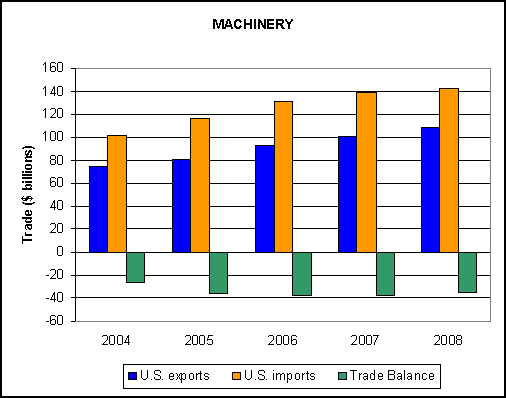View Section in Publication :: Return to Overview

Key Economic Trends
- In 2008, the U.S. trade deficit in machinery decreased by $3.2 billion (8 percent) to $34.7 billion. The decrease in the U.S. trade deficit resulted from continued expanding global demand, largely driven by continuing economic growth in East Asia and North America, and the depreciation of the U.S. dollar relative to currencies of a number of major trading partners, which coincided with increases in export volumes and comparatively small changes in import values.
- In 2008, U.S. exports of machinery increased by $6.6 billion (7 percent) to $107.9 billion. The increase in exports was driven by a number of factors, including a depreciation of the U.S. dollar, strong business machinery replacement demand, and price increases on goods included in the machinery product mix. The leading export growth sectors included farm and garden machinery, miscellaneous machinery, and electric motors; exports of these products rose by $2.3 billion, $1.8 billion, and $1.4 billion, respectively, in 2008.
- In 2008, U.S. imports of machinery increased by $3.4 billion (3 percent) to $142.6 billion. The rise in imports of all types of machinery was driven by a number of factors, including an annual U.S. GDP growth rate of 1.1 percent in 2008 and investment in new equipment by U.S. companies to boost production. The machinery sectors with the largest import growth in 2008 were miscellaneous machinery, farm and garden machinery, and industrial thermal-processing equipment, which rose by $810 million, $772 million, and $738 million, respectively.
Trade Shifts in 2008 from 2007
- U.S. trade deficit: Decreased by $3.2 billion (8 percent) to $34.7 billion
- U.S. exports: Increased by $6.6 billion (7 percent) to $107.9 billion
- U.S. imports: Increased by $3.4 billion (3 percent) to $142.6 billion
Selected Product Shifts
Other Resources
- Gardner Publications Inc. - Metalworking Insiders' Report
- Metal Center News Online - 2009 Directory of Toll Processors
- National Association of Manufacturers - The Manufacturing Institute
- The Association of Electrical and Medical Imaging Equipment Manufacturers (NEMA)
- Precision Manufacturing Institute


















